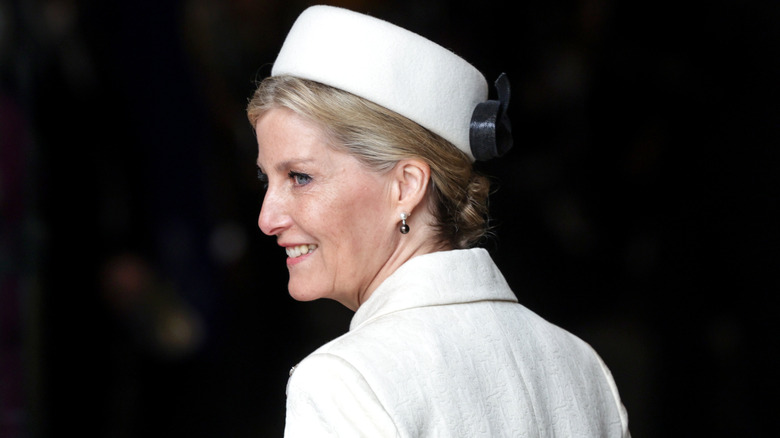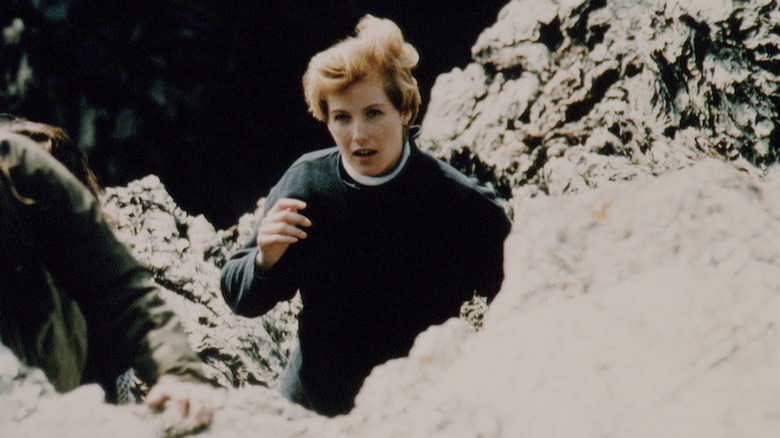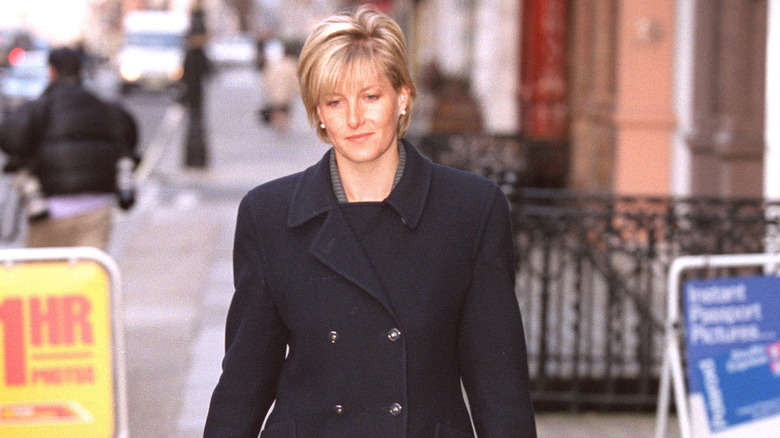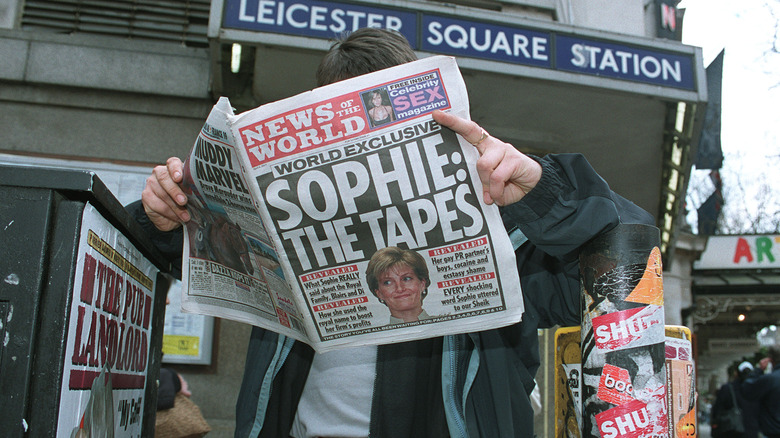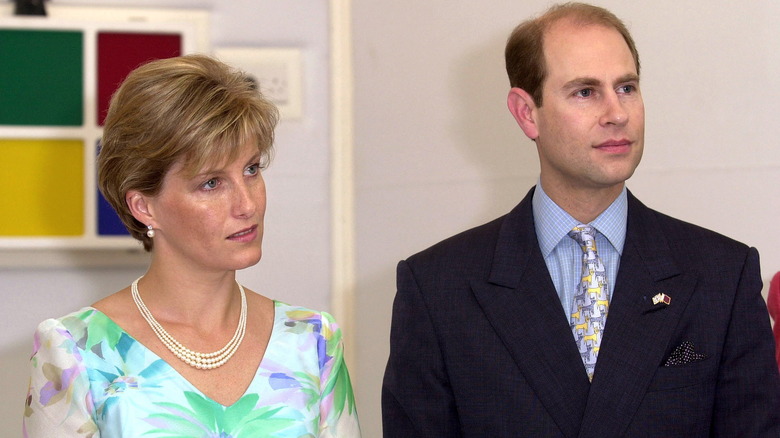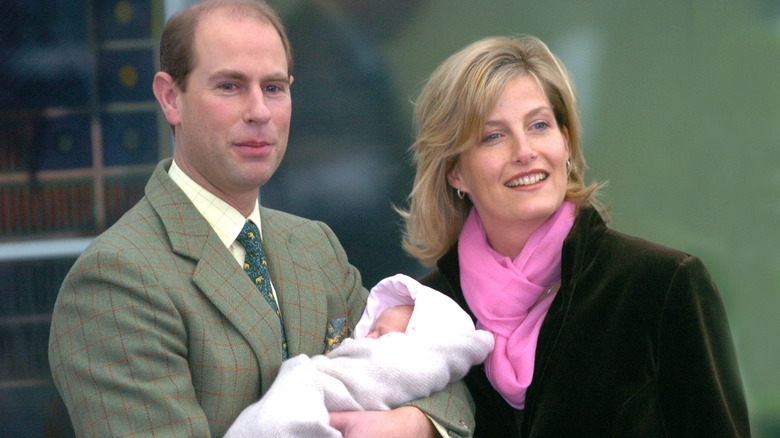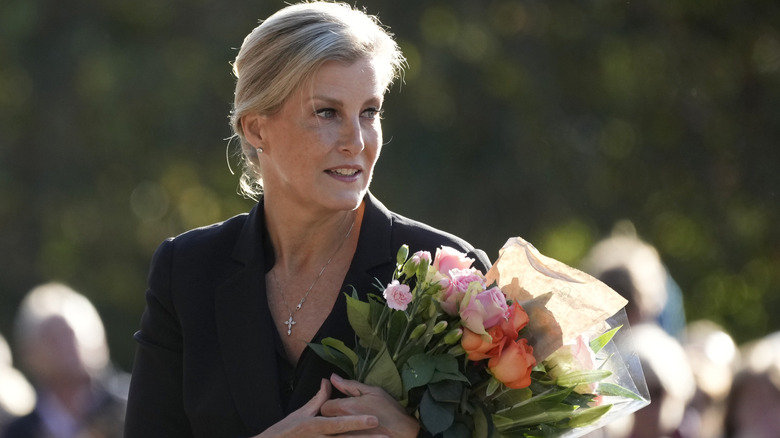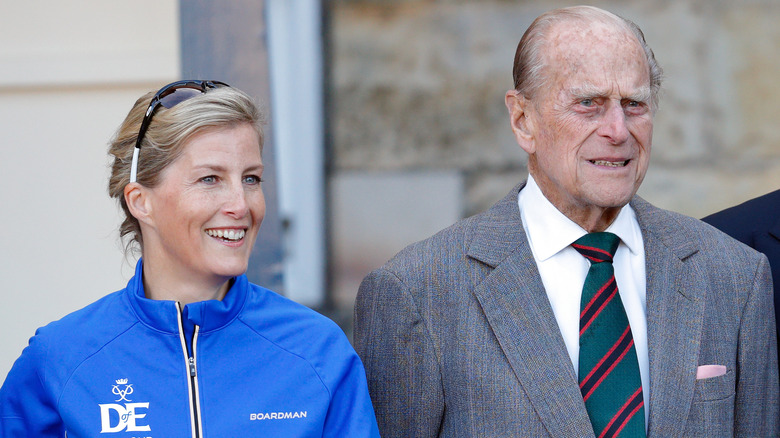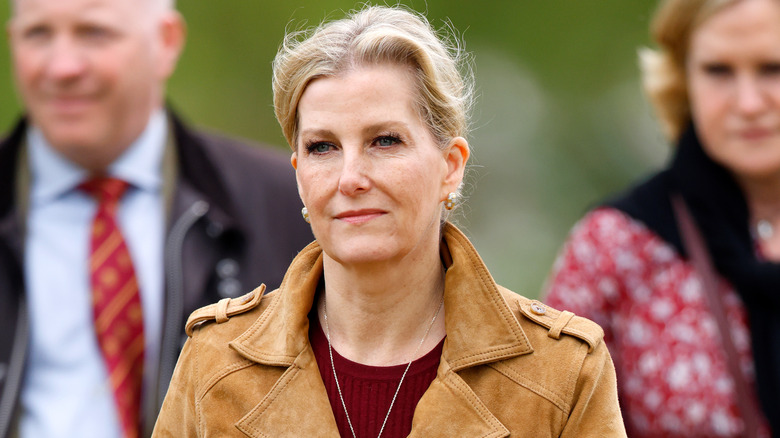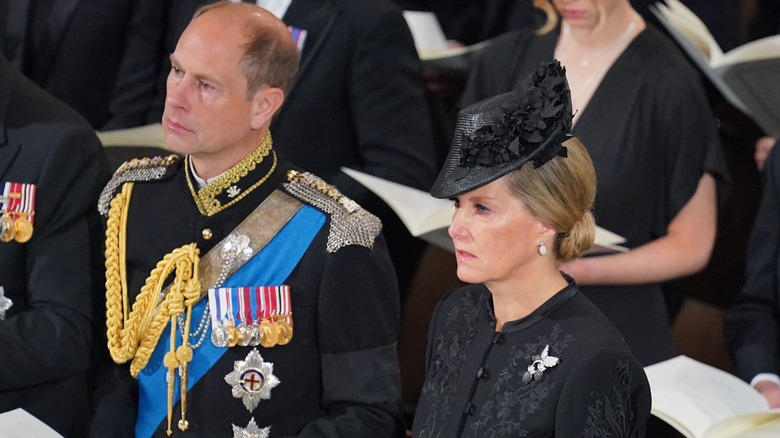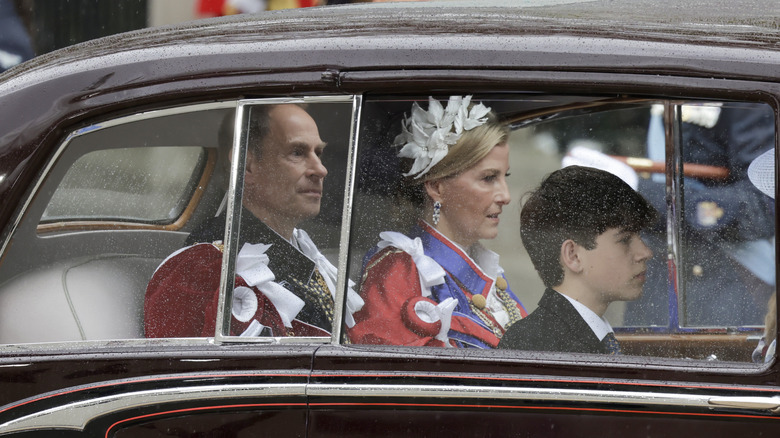The Tragic Truth Of Sophie, Duchess Of Edinburgh
These days, Sophie, Duchess of Edinburgh, is renowned for her good relationship with the royal family. In particular, Sophie, who is married to Prince Edward, was a close confidant of her late mother-in-law, Queen Elizabeth II. Forging this bond was one impressive feat considering that Elizabeth once struggled to warm to Camilla, Queen Consort, the wife of her most prominent son and successor, King Charles III. "I think it's because she never makes any demands of HM," a royal aide told The Telegraph in 2021. "When the Queen appears, even for private family gatherings, she will quickly find a crowd gathered around her. The Countess always stands back and I think the Queen appreciates that." However, things weren't always so rosy between Sophie and the royals.
Though she leads a charmed life as a duchess and haute couture connoisseur, Sophie has endured considerable tragedy. However, suffering multiple traumas has enabled the duchess to be ever more grateful for what she does have, and has in turn become keenly involved in numerous charitable causes close to her heart.
Growing up, Sophie, Duchess of Edinburgh, had a difficult relationship with her mother
Sophie, Duchess of Edinburgh, may live a lavish lifestyle, but she hails from humble origins. She was born in 1965 to middle-class parents Christopher Rhys-Jones, a salesman, and Mary O'Sullivan, a secretary. As ordinary as her childhood appeared, Sophie reportedly struggled to connect with her mother while growing up. This continued into Sophie's adulthood, with her husband, Prince Edward, finding it hard to develop any sort of meaningful rapport with his mother-in-law, who may have struggled with alcohol misuse. "I have tried very hard with her, you know, but it is impossible," said Edward, per the Daily Mail. O'Sullivan had a traumatic childhood, having lost both her father and stepfather at a young age, which may help elucidate her difficulty in connecting with Sophie.
When she became a parent herself, Sophie reportedly struggled with the concept of motherhood, having never had a strong maternal figure in her life. However, in time, she developed a strong bond with her mother-in-law, Queen Elizabeth II, who was known to always look out for her. In 2019, she even referred to the queen as her "mama."
"Mama, when I have returned from my travels, I have been so proud to share with you the work I have witnessed being carried out under ... the Queen Elizabeth Diamond Jubilee Trust," she sweetly told her mother-in-law at a Buckingham Palace reception (via People), thus exemplifying Elizabeth's role as a surrogate mother to Sophie.
The Duchess of Edinburgh was left distraught after intimate photos were published without her consent
Prior to marrying Prince Edward, Sophie, Duchess of Edinburgh, was working as a PR executive. As such, she made a number of high-profile contacts, including British celebrity Chris Tarrant of "Who Wants to Be a Millionaire?" and DJ Kara Noble. In 1988, Sophie, Tarrant, and Noble went on a business trip to Spain, where the duchess was photographed sunbathing topless.
In 1999, before Sophie was due to marry Edward, Noble sold the topless photos to The Sun. Accordingly, the controversial tabloid published the snaps without Sophie's consent. She was deeply distraught at the invasion of privacy and Noble's betrayal of her trust. Noble, who had taken the photos, was subsequently fired from her radio station. "I remember Sophie ringing me in the early hours of the morning, in floods of tears, when she discovered that The Sun had bought the picture and was planning to publish it," Sophie's former colleague, Murray Harkin, told The Telegraph. "She was so upset because she felt that she was 'letting the side down' before her wedding." The Sun later issued an apology and stated that it wouldn't publish any more topless photos of the duchess.
Princess Catherine was the victim of a similar stunt in 2012, when French magazine Closer published non-consensual topless photos. Accordingly, Sophie reportedly offered Catherine her support. "Sophie will be a shoulder for Kate to lean on," Harkin said.
Public perceptions of Sophie soured following the News of the World scandal
In the spring of 2001, Sophie, Duchess of Edinburgh, was involved in one of the biggest royal scandals. Mazher Mahmood, an undercover reporter for the now defunct News of the World tabloid, posed as a sheik supposedly interested in doing business with Sophie's PR firm, R-JH.
The sting operation saw Sophie and her business partner, Murray Harkin, duped into making some rather unsavory remarks about the royal family and then-Prime Minister Tony Blair, all the while being secretly recorded. Notably, Harkin suggested that there was some veracity to claims that Prince Edward was LGBTQ. The pair also offered the purported sheik exclusive access to the royals, which was highly controversial since royals are not supposed to exploit their lofty position for monetary gain.
A major scandal erupted, with some politicians calling for reforms to the monarchy in the wake of Sophie's conduct. Queen Elizabeth II was deeply upset by the sting operation, but remained steadfast in her support of her daughter-in-law. As a result of the controversy, the duchess stepped down from R-JH. "I am deeply distressed by the carrying out of an entrapment operation on me and my business but I also much regret my own misjudgment in succumbing to that subterfuge," she said, per The Guardian. Though the scandal damaged Sophie's reputation for a while, she did eventually bounce back, proving her loyalty to the firm by becoming a full-time working royal.
Sophie had an ectopic pregnancy and lost her baby
Following her wedding to Prince Edward in 1999, Sophie, Duchess of Edinburgh, revealed that she was in no rush to have children, and would pursue IVF in future if necessary. By 2001, she was pregnant with her first child, but fell ill at home. Experiencing excruciating stomach pain, she lost a worrying amount of blood and had to be airlifted to hospital, where she was found to have had an ectopic pregnancy — a situation that occurs when a fetus develops outside the uterus.
Following a three-hour operation, Sophie's life was saved, but she was severely distraught at having lost her baby. "Obviously it is a fairly traumatic time," Edward said after visiting his wife in hospital, per The Guardian. "Anybody who knows anything about this will know that it is the most painful thing for anybody to undergo. It was a pretty traumatic experience." Following the tragic loss, Sophie remained remarkably pragmatic, telling reporters that perhaps the pregnancy wasn't meant to be. "I'm obviously very sad — but it was just not meant to be," she said, per the BBC. "But there will be other chances."
It had been a difficult year for Sophie, who was also embroiled in the News of the World scandal months earlier. "It has been a year of hell for both of them and it has ended in a dreadfully personal and tragic way," a friend told the The Standard. "The Countess is terribly, terribly upset."
Sophie nearly died giving birth to Lady Louise Windsor
After losing her baby in 2001, Sophie, Duchess of Edinburgh, became pregnant again two years later. This pregnancy was also traumatic. In November 2003, a month before she was due to give birth, Sophie became ill with acute placental abruption and was rushed to hospital, where she had to undergo a cesarean section. Having suffered massive blood loss, the duchess was reportedly just 15 minutes away from dying at the emergency room; worse, still, was the fact that she had to endure the terrifying ordeal without her husband by her side (Prince Edward was in Mauritius at the time, but arrived in the U.K. the following day). "She nearly died," royal expert Ingrid Seward told The Times. "The Queen went to see her in hospital, which was unheard of."
Though mother and baby recovered, the duchess reportedly struggled to get over the ordeal. "It was utterly traumatic, and in some ways Sophie has never got over it," a friend told the Daily Mail. "It completely reshaped her character and affected how she relates to her children."
As a result of her traumatic premature birth, Sophie's daughter, Lady Louise Windsor, has esotropia, a rare condition that causes her eyes to look in different directions. She has undergone a number of surgeries and her mom has subsequently become an advocate for various sight charities. "Her squint was quite profound when she was tiny and it takes time to correct it," Sophie told Express.
Sophie, Duchess of Edinburgh, struggled to come to terms with losing her mother
Though they reportedly had a difficult relationship, Sophie, Duchess of Edinburgh, and her mother, Mary O'Sullivan, remained close. In 2005, O'Sullivan died six months after being diagnosed with stomach cancer. She was 71. Sophie, who had reportedly been caring for her mother since her diagnosis, was devastated by the loss. "The countess was very close to her mother and this is a very sad time," a Buckingham Palace spokesperson said, per the Mirror. "She is being comforted by her husband but she is deeply saddened."
In 2021, Sophie opened up about her mother's death at a National Federation of Women's Institutes meeting, revealing that she struggled to come to terms with the loss. "To this day, I miss her very much," she said, per Express. "And there are moments where I hear some music she loved or I do something I know she'd have wanted to hear about, which makes her early departure very hard." Prior to her mother's death, Sophie ensured that she got to spend time with her granddaughter, Lady Louise Windsor, who was less than 2 years old at the time. However, she never got to meet her grandson, James, Earl of Wessex, who was born in 2007. "She has missed out on so much, and I'm particularly sad that she hasn't seen my children grow up or seen how my work has grown and developed," Sophie reflected in her speech.
Sophie, Duchess of Edinburgh, was heartbroken by Prince Philip's death
Though Prince Philip was famed for his controversial persona, making notoriously offensive comments during royal tours, Sophie, Duchess of Edinburgh, saw a different side to her late father-in-law. From the outset, Philip and Sophie shared an incredibly close bond. "She got on very well with Philip. She knew how to handle him," royal expert Ingrid Seward told The Times. "The Queen always found that a bit of a relief, if female members of the family knew how to handle Philip. She made him laugh, and was not fazed by his abruptness. She would not let him bully her."
When Philip died in 2021, just months before what would have been his 100th birthday, Sophie was left heartbroken. In an interview with BBC Radio 5 Live, the duchess broke down in tears while discussing her loss. "Well, he has left a giant-sized hole in our lives," she said. The COVID-19 pandemic exacerbated her grief, as she was unable to spend time with Philip and Queen Elizabeth II in the lead-up to the former's death. "It's only when you would do the normal things that you would have done with them, and you suddenly realize that they are not there, that you really start to have an 'Oh my goodness' moment," she poignantly reflected. Due to the pandemic, Philip had a socially restricted lockdown funeral, meaning that only a few people could attend; for Sophie, this intensified an already harrowing experience.
Sophie, Duchess of Edinburgh's health issues impacted her ability to work
Openly discussing health concerns has long been a taboo among the royal family, with ailing royals opting to remain secretive about their illnesses. However, Sophie, Duchess of Edinburgh, has tried to break this taboo. In 2021, she opened up about the distressing side effects of the menopause, including memory loss. These issues led to her fearing that she had lost her intellect and cognitive abilities, as she found it difficult to get through her royal engagements.
"You suddenly can't remember what on earth it was you were talking about," she said in a speech for the charity Wellbeing of Women, per Hello! "Try being on an engagement when that happens. Your words just go ... 'What has just happened to me?' ... It's like someone has just gone and taken your brain out for however long before they pop it back in again, and you try and pick up the pieces and carry on."
Subsequently, she has campaigned for employers to offer support for those struggling to deal with the effects of menopause. "To think that women are having to leave the workplace because of this is tragic," she said at a virtual conference, per the Independent. "We are fabulous in our 40s, we are even more fabulous in our 50s, 60s and 70s and we need to celebrate that and keep those opportunities going for women."
Sophie, Duchess of Edinburgh, lost a close confidant in Queen Elizabeth II
Queen Elizabeth II was never the same after Prince Philip died. Sophie, Duchess of Edinburgh, who was apparently the queen's "favorite child" was there to support Elizabeth as she came to terms with her husband's death. Speaking to The Sun in 2021, royal sources revealed that Sophie had been traveling 10 miles from her home in Bagshot Park to Windsor Castle several times a week to keep an eye on Her Majesty. "Sophie Wessex has emerged as the Queen's unlikely 'rock' as the monarch adjusts to life without Prince Philip," royal commentator Duncan Larcombe said.
Just over a year after her husband's death, Elizabeth died in September 2022, aged 96. The late monarch was like a mother to Sophie, so her death was akin to the duchess losing her mother all over again. "The Queen's passing has left an unimaginable void in all our lives," Sophie and her husband, Prince Edward, said in a statement, per Sky News.
At the queen's funeral, Sophie and Edward, were in tears, notably standing out as the most emotional mourners at the gathering. "Sophie watched with an expression of concern, herself clutching a hankie in one hand that she had been dabbing her tears with," body language expert Judi James told The Sun. "Her checking of her skirt and her frequent movements of her handbag from lap to side to floor and back again signaled the emotional distress she is still suffering."
The duchess was left distraught when her police escort fatally injured an elderly woman
King Charles III's coronation didn't go exactly to plan, with celebrity guests rejecting invites and Charles' strained relationship with his son, Prince Harry, threatening to disrupt proceedings. But for Sophie, Duchess of Edinburgh, the momentous occasion turned into a tragedy. While being escorted from the ceremony in May 2023, Sophie's police motorcade struck Helen Holland, an elderly woman who had been crossing the road while visiting her sister in London. Holland was taken to hospital, remaining in a coma for nearly two weeks. However, she had suffered catastrophic brain damage and succumbed to her injuries, aged 81.
"The Duchess of Edinburgh is deeply saddened to hear that Helen Holland has passed away," said a Buckingham Palace spokesperson, per the Mirror. "Her Royal Highness's deepest condolences and sympathies go to all of Ms Holland's family." Though Sophie was not driving the motorcade, the incident led to some criticism of the duchess. However, speaking to the Daily Mail, Holland's son, Martin, said that he did not blame Sophie; rather, he argued that police escorts need to be more mindful of the public. "It's not Sophie's fault. We don't blame her — the police did it ... I know the royals need to be protected but they need to do it so it doesn't endanger the public," Martin said. The Independent argued that Sophie, though innocent of any wrongdoing, would likely be forever haunted by Holland's death.
